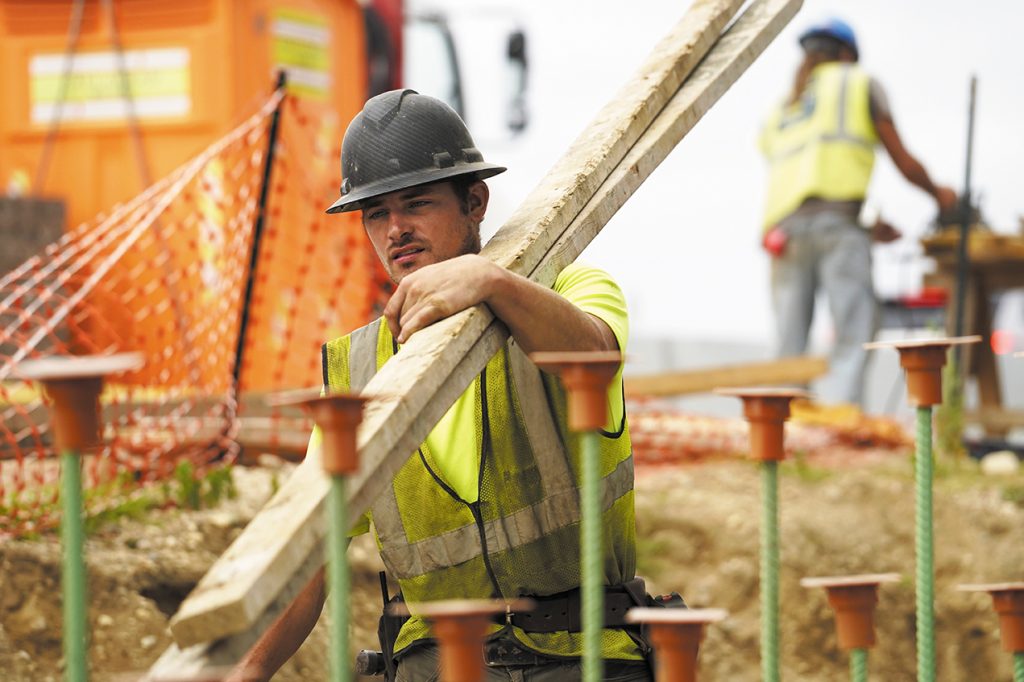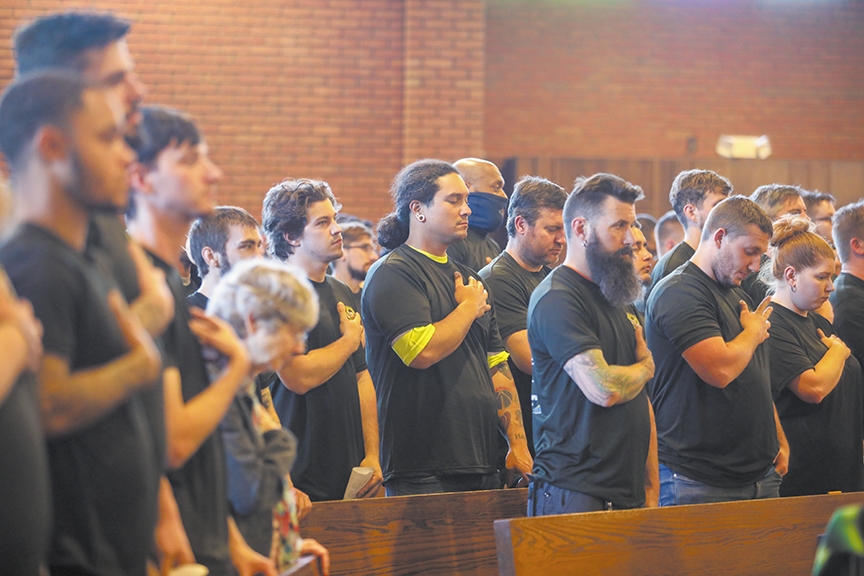
With families packing up for one last weekend of camping in the woods or one last day at the lake, it’s a sure sign that Labor Day is approaching, traditionally signaling the end of summer.
The long weekend before the first Monday of September, which marks the holiday each year, is often set aside for these last barrels of fun as grills are fired up one last time and one last refreshing swim in the pool is had before the crisp air of fall rolls in.
But since its declaration as a national holiday by President Grover Cleveland in 1894, Labor Day, at its core, has been “a celebration of the social and economic achievements of American workers … and the many contributions workers have made to America’s strength, prosperity and well-being,” according to the U.S. Department of Labor,
This celebration of the dignity and rights of the working person and their contribution to society has been echoed by the Catholic Church for more than a century. Rooted in scripture from Genesis to the prophets and the Gospels to the epistles, workers’ rights and the dignity of work have become important pieces of Catholic social teaching.
Church leaders have long taught that in successful societies people have equal opportunities to earn wages that allow them to support themselves and their families. And they have recognized the important role labor unions have played in achieving those goals in a wide variety of countries and economic systems around the world.
From the successors of Peter
The successors of Peter, particularly since Pope Leo XIII’s 1891 encyclical Rerum Novarum (On Capital and Labor), have had much to say about the dignity of work and the rights of workers. St. John Paul II, Pope Emeritus Benedict XVI and Pope Francis have all reiterated the teaching of Rerum Novarum, and other Church leaders have followed suit.
“Work is more than a way to make a living; it is a form of continuing participation in God’s creation,” according to the U.S. Conference of Catholic Bishops. “If the dignity of work is to be protected, then the basic rights of workers must be respected – the right to productive work, to decent and fair wages, to the organization and joining of unions, to private property, and to economic initiative.”
St. John Paul II dedicated two encyclicals to this aspect of Catholic social teaching during his time as pope. The first was Laborem Exercens (Through Work) in 1981, and the second was Centesimus Annus (On the Hundredth Anniversary of Rerum Novarum) in 1991.
“Through work, many must earn his daily bread and contribute to the continual advance of science and technology and, above all, to elevating unceasingly the cultural and moral level of the society within which he lives in community with those who belong to the same family,” St. John Paul II said in Laborem Exercens.
“Man must work out of regard for others, especially his own family, but also for the society he belongs to, the country of which he is a child, and the whole human family of which he is a member, since he is the heir to the work of generations and at the same time a sharer in building the future of those who will come after him in the succession of history,” he added.
In Centesimus Annus, he continued, saying, “In our time, the role of human work is becoming increasingly important as the productive factor both of non-material or material wealth. Moreover, it is becoming clearer how a person’s work is naturally interrelated with the work of others. More than ever, work is work with others and work for others: It is a matter of doing something for someone else.”
As part of the Catholic social teaching, the Holy Fathers have also recognized that part of the fulfillment of the dignity of work and the rights of workers has come in the opportunity to form and join unions.
“The most important of all [workplace associations and organizations] are workingmen’s unions. … Such unions should be suited to the requirements of this our age – an age of wider education, of different habits, and of far more numerous requirements in daily life,” said Pope Leo in Rerum Novarum. “It is gratifying to know that there are actually in existence not a few associations of this nature, consisting either of workmen alone, or of workmen and employers together, but it were greatly to be desired that they should become more numerous and more efficient.”
Pope Benedict XVI made sure it was clear; however, that these unions should seek to protect those inside and outside of said union, in his 2009 encyclical Caritas in Veritate (Charity in Truth).

“Through the combination of social and economic change, trade union organizations experience greater difficulty in carrying out their task of representing the interests of workers, partly because governments, for reasons of economic utility, often limit the freedom or the negotiating capacity of labor unions,” Pope Benedict said.
“The repeated calls issued within the Church’s social doctrine, beginning with Rerum Novarum, for the promotion of workers’ associations that can defend their rights must therefore be honored today even more than in the past, as a prompt and far-sighted response to the urgent need for new forms of cooperation at the international level, as well as the local level,” he wrote.
“The global context in which work takes place also demands that national labor unions, which tend to limit themselves to defending the interests of their registered members, should turn their attention to those outside their membership, and in particular to workers in developing countries where social rights are often violated,” the encyclical continues. “The protection of these workers, partly achieved through appropriate initiatives aimed at their countries of origin, will enable trade unions to demonstrate the authentic, ethical and cultural motivations that made it possible for them, in a different social and labor context, to play a decisive role in development.”
In an address given to delegates from the Italian Confederation of Workers’ Unions, known as the CISL, on June 28, 2017, Pope Francis echoed some of these thoughts, saying the labor movement has two challenges to face and defeat “if it wants to continue to perform its essential role for the common good,” and they are prophecy and innovation.
“Unions are an expression of the prophetic profile of society. Unions are born and reborn each time that, like the biblical prophets, they give a voice to those who have none, denounce those who would ‘sell the needy for a pair of sandals’ (cf. Amos 2:6), unmask the powerful who trample the rights of the most vulnerable workers, defend the cause of foreigners, the least, the rejected,” Pope Francis said.
“As shown by the great traditions of CISL, the unions movement has its great seasons when it is prophecy.” he added. “But in our advanced capitalist societies, unions risk losing their prophetic nature and becoming too similar to the institutions and powers that they should be criticizing instead.
“With the passage of time, unions have ended up bearing too much resemblance to politics, or rather, to political parties, their language, their style,” Pope Francis said. “However, if this typical and diverse dimension is lacking, their action within businesses will also lose strength and effectiveness. This is prophecy.
“Prophets are sentinels, who keep watch from their lookout post. Unions too must keep vigil over the walls of the city of work, like a watchman who guards and protects those who are inside the city of work, but who also guards and protects those who are outside the walls,” Pope Francis continued. “Unions do not carry out their essential function of social innovation if they watch over only those who are inside, if they protect the rights of only those who already work or who are retired. This must be done, but it is half of your work. Your vocation is also to protect those who do not yet have rights, those who are excluded from work and who are also excluded from rights and from democracy.”
It’s because of these things that “the capitalism of our time does not understand the value of trade unions, because it has forgotten the social nature of economy, of business,” Pope Francis said.
“This is one of the great errors. Market economy: no. Let us say, ‘social market economy,’ as St. John Paul II taught. The economy has forgotten the social nature that it has as its vocation, the social nature of business, of life, of bonds and pacts,” Pope Francis said.
“But perhaps our society does not understand unions also because it does not see them fight hard enough for the ‘rights of the “not yet”: in the existential peripheries, among those rejected from work,” he said.
“There is no good society without a good union, and there is no good union that is not reborn every day in the peripheries, that does not transform the economy’s rejected stones into its cornerstones,” he concluded. “‘Sindacato’, (the Italian word for ‘union’), is a beautiful word: it comes from the Greek ‘dike’, or ‘justice’, and ‘syn’, together: syn-dike, ‘justice together’. There is no ‘justice together’ if ‘together’ does not include today’s excluded people.”
Union membership has been in decline for several decades. But recently workers have shown more interest in forming and joining a union. Employees of some businesses have taken the initiative to unionize and advocate for better pay and benefits. Workers at an Amazon warehouse in Staten Island, New York, voted to unionize earlier this year, and workers at an Amazon warehouse in Albany, New York, recently filed a petition for a union election. Also, workers at more than 200 Starbucks stores have voted to unionize, and first-ever unions have formed at Apple, Google Fiber, Trader Joe’s, Kickstarter, and Activision Blizzard, according to reports by the National Labor Relations Board.
But no matter what initiative is taken to fulfill the dignity of work and the rights of workers for all, Pope Leo said the Church will always be there in support.
“In regard to the Church, her cooperation will never be found lacking, be the time or the occasion what it may; and she will intervene with all the greater effect in proportion as her liberty of action is the more unfettered,” said Pope Leo in Rerum Novarum.
“Let this be carefully taken to heart by those whose office it is to safeguard the public welfare,” he added. “Every minister of holy religion must bring to the struggle the full energy of his mind and all his power of endurance. Moved by your authority, venerable brethren, and quickened by your example, they should never cease to urge upon men of every class, upon the high-placed as well as the lowly, the Gospel doctrines of Christian life; by every means in their power they must strive to secure the good of the people; and above all must earnestly cherish themselves, and try to arouse in others, charity, the mistress and the queen of virtues.
“For, the happy results we all long for must be chiefly brought about by the plenteous outpouring of charity; of that true Christian charity, which is the fulfilling of the whole Gospel law, which is always ready to sacrifice itself for others’ sake,” the encyclical concludes, “and is man’s surest antidote against worldly pride and immoderate love of self; that charity whose office is described and whose Godlike features are outlined by the Apostle St. Paul in these words: ‘Charity is patient, is kind, … seeketh not her own, … suffereth all things, … endureth all things.’”









